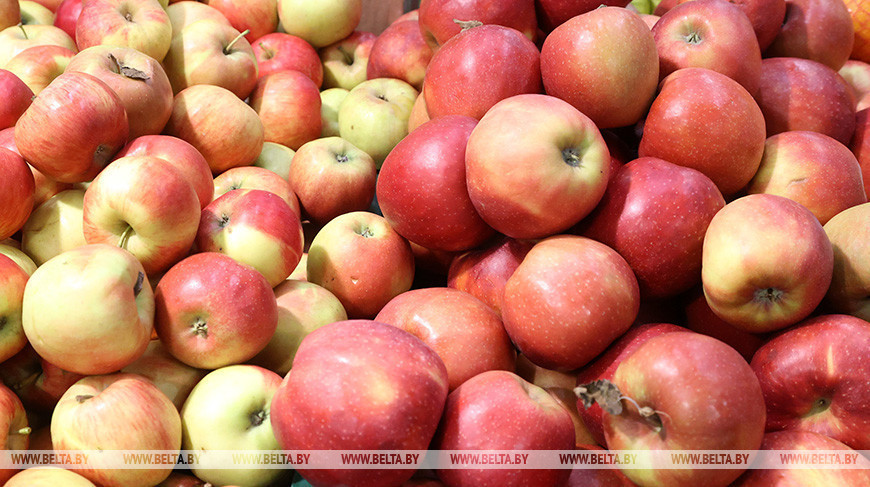
MINSK, 13 February (BelTA) – Steps to increase food supplies, export of premixes and mixed fodder of the Belarusian National Biotechnology Corporation (BNBC), as well as cooperation in breeding livestock and quality training of personnel of various agricultural professions were discussed at the talks with head of the Republic of North Ossetia-Alania Sergei Menyailo during a meeting at the Belarusian Agriculture and Food ministry, BelTA has learned.
Belarus' interest in scaling up cooperation with the Russian region in the agro-industrial complex was emphasized at the start of the talks. According to official statistics, mutual trade slightly decreased last year, but, as the participants of the meeting stressed, the figures do not mean that Belarusian products are not known in North Ossetia. On the contrary, Belarusian food products are widely represented in federal chain stores and private retail outlets. According to Belarusian First Deputy Agriculture and Food Minister Aleksandr Lomsky, the key task for the partners today is to ensure an increase in mutual supplies. The parties also shared their vision of how Belarusian-Ossetian relations in agriculture could be significantly diversified.
Belarus suggested increasing supplies of food products, including meat and dairy products, to North Ossetia. The range of goods that Belarus has already been shipping to the region or can offer is extremely wide, and there are no doubts about the high quality of Belarusian products.
The Belarusian Agriculture and Food Ministry considers that another promising area for the development of cooperation is wider exports of BNBC products to this Russian region. The corporation is ready to supply more essential amino acids, premixes and mixed fodder for all kinds of farm animals to the North Caucasian republic.
“The Belarusian National Biotechnology Corporation is an ultramodern enterprise fitted with multifunctional equipment. The company keeps increasing the production of products demanded not only in the domestic market, but also in the Russian market,” Aleksandr Lomsky said. “Last year the company produced 96,000 tonnes of mixed fodder, including 64,000 tonnes for cattle and approximately 11,000 tonnes for pigs, poultry and fish, as well as 10,000 tonnes of premixes and 59,000 tonnes of amino acids. The BNBC supplies most of its products to Russia through a distributor. I hope that thanks to the agreements reached, the supplies of the corporation's products will increase every year.”
North Ossetia was also invited to think about establishing cooperation with Belarus in livestock breeding. In addition to biomaterial of high-value bulls producing dairy and meat breeds, the Belplemzhivobyedinenie livestock farm and affiliated enterprises are ready to consider other vectors of mutually beneficial partnership. Aleksandr Lomsky listed Holstein, Simmental, Belgian Blue, Hereford, and Limousin breeds as valuable.
Finally, North Ossetia may be interested in the scientific potential of Belarusian agricultural universities, which are engaged not only in training, but also in retraining of personnel in a wide range of agricultural specialties.
Head of North Ossetia Sergei Menyailo also made a number of constructive proposals for the development of relations with Belarus in agriculture. It was noted that the region accounts for 20% of the Russian trout market. Plans are in place to build an aquaculture breeding center in the region - the only one in the south of the federation. The center will grow other fish species as well. Russian specialists are ready to share the technology of fish and fodder production with Belarusian colleagues.
There are also certain prospects for developing relations with Belarus in vegetable and fruit growing. According to Sergei Menyailo, North Ossetia has Russia's largest farm for growing asparagus, which was considered a nontypical crop for Russian farmers about 30 years ago. Alania produces a lot of apples and renews its orchards. The region has also started to revive viticulture and cultivate blueberries. The region hosts a regular conference of potato growers, which is attended by professionals from different parts of the country and from far abroad, in particular Canada. According to the head of the North Caucasus republic, it is possible to find points of contact with Belarusian farmers, enterprises and scientists in each of the above-mentioned areas.
Deputy Chairman of the Belarusian state food industry concern Belgospishcheprom Aleksandr Yakovchits mentioned that the Malorita canning and vegetable processing plant purchases large numbers of apples for the production of direct-pressed juices, while the branch of the Gorodeya sugar plant in Stolbtsy makes canned asparagus beans. The enterprises will consider possible options for cooperation.
The representatives of Belarus and North Ossetia stressed that cooperation should be built so as not to race against each other in the market, but to complement each other in the supply of goods and technologies.
The delegation of the Republic of North Ossetia-Alania is paying a visit to Belarus on 11-14 February. The Russian partners have already visited the Belarusian automaker MAZ and a number of other major machine-building enterprises. Negotiations in the Belarusian government are planned as part of the visiting program.
Belarus' interest in scaling up cooperation with the Russian region in the agro-industrial complex was emphasized at the start of the talks. According to official statistics, mutual trade slightly decreased last year, but, as the participants of the meeting stressed, the figures do not mean that Belarusian products are not known in North Ossetia. On the contrary, Belarusian food products are widely represented in federal chain stores and private retail outlets. According to Belarusian First Deputy Agriculture and Food Minister Aleksandr Lomsky, the key task for the partners today is to ensure an increase in mutual supplies. The parties also shared their vision of how Belarusian-Ossetian relations in agriculture could be significantly diversified.
Belarus suggested increasing supplies of food products, including meat and dairy products, to North Ossetia. The range of goods that Belarus has already been shipping to the region or can offer is extremely wide, and there are no doubts about the high quality of Belarusian products.
The Belarusian Agriculture and Food Ministry considers that another promising area for the development of cooperation is wider exports of BNBC products to this Russian region. The corporation is ready to supply more essential amino acids, premixes and mixed fodder for all kinds of farm animals to the North Caucasian republic.
“The Belarusian National Biotechnology Corporation is an ultramodern enterprise fitted with multifunctional equipment. The company keeps increasing the production of products demanded not only in the domestic market, but also in the Russian market,” Aleksandr Lomsky said. “Last year the company produced 96,000 tonnes of mixed fodder, including 64,000 tonnes for cattle and approximately 11,000 tonnes for pigs, poultry and fish, as well as 10,000 tonnes of premixes and 59,000 tonnes of amino acids. The BNBC supplies most of its products to Russia through a distributor. I hope that thanks to the agreements reached, the supplies of the corporation's products will increase every year.”
North Ossetia was also invited to think about establishing cooperation with Belarus in livestock breeding. In addition to biomaterial of high-value bulls producing dairy and meat breeds, the Belplemzhivobyedinenie livestock farm and affiliated enterprises are ready to consider other vectors of mutually beneficial partnership. Aleksandr Lomsky listed Holstein, Simmental, Belgian Blue, Hereford, and Limousin breeds as valuable.
Finally, North Ossetia may be interested in the scientific potential of Belarusian agricultural universities, which are engaged not only in training, but also in retraining of personnel in a wide range of agricultural specialties.
Head of North Ossetia Sergei Menyailo also made a number of constructive proposals for the development of relations with Belarus in agriculture. It was noted that the region accounts for 20% of the Russian trout market. Plans are in place to build an aquaculture breeding center in the region - the only one in the south of the federation. The center will grow other fish species as well. Russian specialists are ready to share the technology of fish and fodder production with Belarusian colleagues.
There are also certain prospects for developing relations with Belarus in vegetable and fruit growing. According to Sergei Menyailo, North Ossetia has Russia's largest farm for growing asparagus, which was considered a nontypical crop for Russian farmers about 30 years ago. Alania produces a lot of apples and renews its orchards. The region has also started to revive viticulture and cultivate blueberries. The region hosts a regular conference of potato growers, which is attended by professionals from different parts of the country and from far abroad, in particular Canada. According to the head of the North Caucasus republic, it is possible to find points of contact with Belarusian farmers, enterprises and scientists in each of the above-mentioned areas.
Deputy Chairman of the Belarusian state food industry concern Belgospishcheprom Aleksandr Yakovchits mentioned that the Malorita canning and vegetable processing plant purchases large numbers of apples for the production of direct-pressed juices, while the branch of the Gorodeya sugar plant in Stolbtsy makes canned asparagus beans. The enterprises will consider possible options for cooperation.
The representatives of Belarus and North Ossetia stressed that cooperation should be built so as not to race against each other in the market, but to complement each other in the supply of goods and technologies.
The delegation of the Republic of North Ossetia-Alania is paying a visit to Belarus on 11-14 February. The Russian partners have already visited the Belarusian automaker MAZ and a number of other major machine-building enterprises. Negotiations in the Belarusian government are planned as part of the visiting program.













